Covid world updates: UK police to issue 20 initial ‘Partygate’ fines
British police have announced they will be issuing at least 20 fines after probing suspected breaches of Covid-19 lockdown laws by Prime Minister Boris Johnson and his staff in Downing Street.
World
Don't miss out on the headlines from World. Followed categories will be added to My News.
British police will issue at least 20 “Partygate” fines, after probing suspected breaches of Covid-19 lockdown laws by Prime Minister Boris Johnson and his staff in Downing Street.
London’s Metropolitan Police said it would not be disclosing the number or identities of those being fined, but Johnson’s spokesman confirmed that the UK leader was not among those hit in the first wave of sanctions.
The news nevertheless revives the so-called “Partygate” scandal, which left Johnson him fighting for political survival after a number of lawmakers from his ruling Conservatives withdrew their support for his leadership.
Opposition politicians promptly reiterated their calls for his resignation following the Met’s announcement on Tuesday.
“We will today initially begin to refer 20 fixed penalty notices to be issued for breaches of Covid-19 regulations,” the Met said in a statement, adding that its investigation was continuing.
“We are making every effort to progress this investigation at speed and have completed a number of assessments,” it added.
Because there was still a “significant amount” of evidence to be assessed, they did not rule out further action.
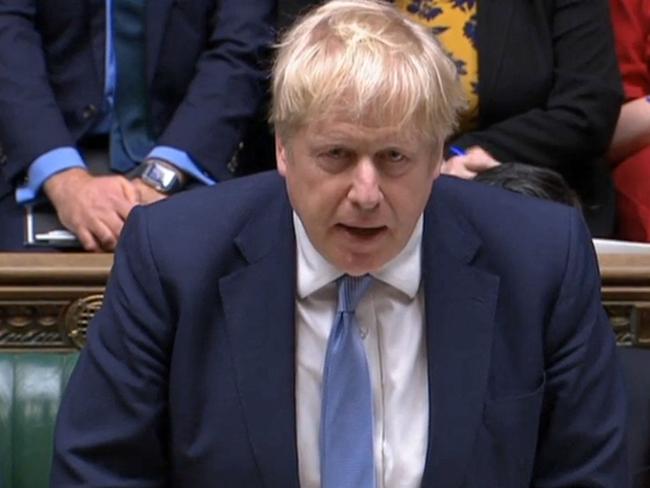
HONG KONG EASES COVID TRAVEL RULE
Hong Kong will halve the period for which it suspends international flights that bring in passengers infected with Covid-19 as it resumes international flights from Australia this week.
The period of which flights confirmed to have carried Covid-positive passengers will be suspended from operating will be cut from 14 days to seven days from April 1.
Hong Kong will resume international flights from Australia, United States, Britain and six other countries on Friday after backlash to some of the world’s toughest Covid-19 restrictions.
After the highly transmissible variant fuelled a wave of cases, authorities banned flights from nine countries deemed high-risk. But infections continued to climb rapidly, with more than a million cases and 5,900 deaths this year.
Once a global logistics and transportation hub, Hong Kong has imposed some of the world’s harshest travel restrictions under its zero-Covid policy.
One of these measures is the city’s “route-specific suspension mechanism”, which previously banned an airline from flying a particular route for 14 days if three or more infections were found among a flight’s passengers.
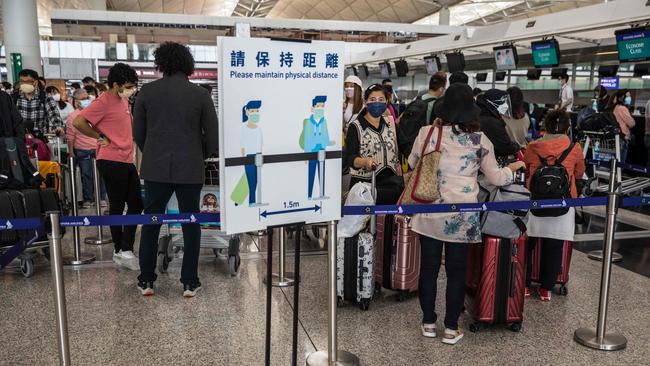
Airlines have been lobbying for its complete removal, but Hong Kong leader Carrie Lam said there was “no room for major relaxation” as preventing imported infections remained “a fundamental pillar of Hong Kong’s anti-epidemic policy”.
Hong Kong's pace of reopening lags behind regional counterparts — especially rival financial hub Singapore, which said last Thursday it will lift restrictions on all vaccinated travellers this week.
Last week, Bloomberg reported that 11 airlines and logistics giants had sent a letter calling for the removal of Covid-19 testing requirements for flight crews before takeoff and on arrival.
“We seek a return to normal flight operations in Hong Kong, in which the city can once again serve as an aviation hub,” they were quoted as saying.
But at Sunday’s press conference, Lam said the government “will never be able to meet the aspirations and needs of the aviation industry”.
“We are in a public health emergency, so every business has to make sacrifices... so I hope and I make an appeal that airlines will also understand.” Lam again refused to draw a detailed roadmap for the city to fully emerge from the health crisis, saying policies had to be adjusted from time to time as the situation developed.
COVID COCKTAIL PREVENTION JAB GETS APPROVAL
AstraZeneca’s Covid-19 prevention cocktail got the green light from Europe’s drug watchdog, broadening treatment options for people unable or unwilling to take coronavirus vaccines.
Evusheld, developed for patients with immune system problems or severe reactions to vaccines, contains two monoclonal antibodies tixagevimab and cilgavimab.
The proteins are designed to attack the spike protein of the Sars-CoV-2 virus at two different sites, the European Medicines Agency said.
The agency’s human medicines committee “recommended granting a marketing authorisation for Evusheld” in adults and adolescents from 12 years of age. It comes days after the jab was approved for use in the UK by Britain’s drug regulator.
Data from a test on 5,000 people who were given two jabs, showed it reduced the risk of Covid-19 infection by 77 per cent and protection lasted for at least six months.
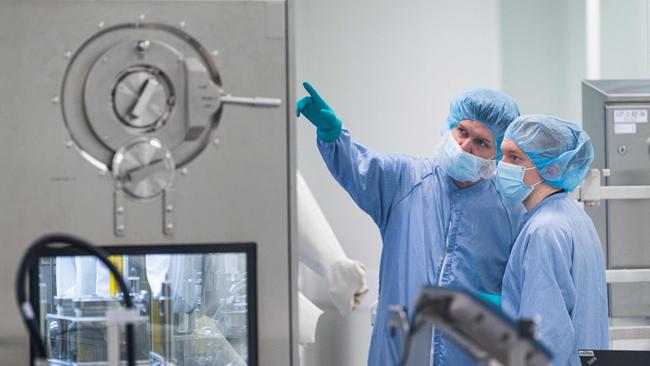
The study was done on adults who had never had Covid-19 and had never received a vaccine or other preventive treatment, the EMA said.
“The safety profile of Evusheld was favourable and side effects were generally mild, with a small number of people reporting reactions at the injection site or hypersensitivity,” the medicines watchdog added.
But the study was done before the emergence of the infectious Omicron strain of the virus and “laboratory studies show that the Omicron BA.1 variant may be less sensitive to tixagevimab and cilgavimab than the Omicron BA.2 variant,” the watchdog said.
The EMA’s recommendation will now be forwarded to the European Commission for final approval before distribution to the 27-member bloc.
SINGAPORE TO LIFT VIRUS TRAVEL CURBS
Singapore will lift restrictions for all vaccinated travellers from next week, with Prime Minister Lee Hsien Loong on Thursday hailing it as a “major milestone” in the aviation hub’s efforts to live with Covid-19.
The city-state is the latest Asian country to ease travel restrictions in a region that has generally been more reluctant to lift barriers than Europe and North America.
A gateway for many travellers arriving in the Asia-Pacific, Singapore had already started quarantine-free travel schemes with some countries in recent months.
From April 1, fully vaccinated adults and unvaccinated children will be allowed to enter the country without quarantining, as long as they take a pre-departure test, officials said.
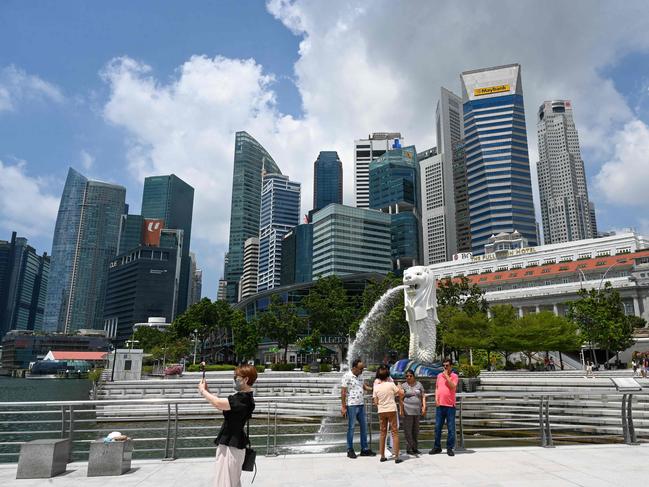
Lee said Singapore had reached a “major milestone” in its efforts to live with the virus.
Easing travel curbs will “reconnect Singapore with the world,” he said in a televised address.
“It will give a much-needed boost to businesses, particularly the tourism sector, and it will help Singapore reclaim its position as a business and aviation hub.” Only travellers on a “restricted list” will face curbs in entering Singapore, although there are currently no countries on the list.
A raft of other coronavirus measures were also eased, with people in Singapore no longer required to wear masks outside, and limits on group sizes raised to 10, up from five previously.
At the start of the pandemic, the country of 5.5 million kept Covid-19 cases low through border closures and a tough lockdown.
It has faced sizeable outbreaks since last year and, with some of the world’s highest vaccination rates, authorities have shifted to a policy of living with the virus.
The pandemic plunged Singapore into its worst-ever recession in 2020 as the trading hub closed its borders.
International visitor arrivals dropped to just 2.7 million that year from more than 19 million in 2019.
Singapore’s approach stands in contrast to rival financial hub Hong Kong, where arrivals are still required to undergo lengthy quarantines in hotels.
Following Singapore’s announcement, Hong Kong leader Carrie Lam was forced to defend her administration’s approach, insisting the Chinese city remained an “attractive” financial centre.
“The policies and measures to be adopted by each government in combating Covid differ,” she said.
Like mainland China, Hong Kong has stuck to a zero-Covid policy, but the approach has led to an exodus of foreign and local residents, and failed to stop a fierce Omicron outbreak in recent months.
Other countries in the Asia-Pacific that have recently announced an easing of travel restrictions include Australia, New Zealand, Indonesia and Malaysia.
MODERNA WANTS SIGN OFF ON INFANT VAX
US biotech firm Moderna said it was pursuing regulatory approval for its Covid vaccine in children aged six months to six years after the two-shot regimen was found to be safe and produced a strong immune response.
Specifically, two doses of 25 micrograms given to this age group generated similar levels of antibodies to two doses of 100 micrograms given to young people aged 18-25, indicating there would be similar levels of protection.
Based on the data, Moderna said it would submit authorisation requests to the US Food and Drug Administration (FDA), European Medicines Agency (EMA) and other global regulators in the coming weeks.
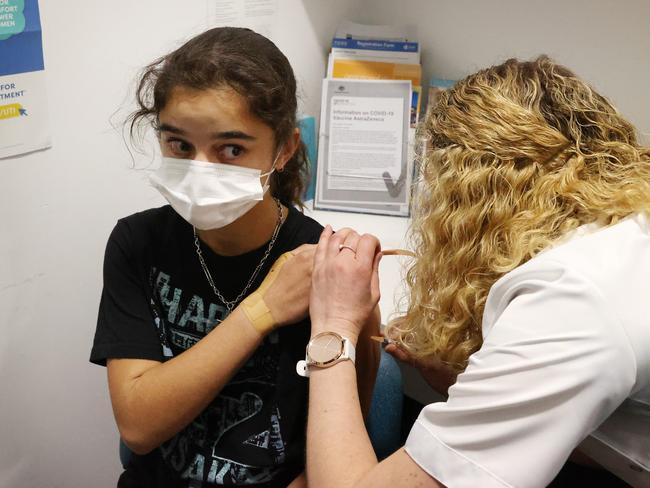
The results “are good news for parents of children under six years of age,” said CEO Stephane Bancel in a statement on Wednesday local time.
“We now have clinical data on the performance of our vaccine from infants six months of age through older adults.” The company did however find relatively low vaccine efficacy against infection, with its trial taking place during the Omicron wave.
Vaccine efficacy in children six months to two years was 43.7 per cent, and vaccine efficacy was 37.5 per cent in the two to under six years age group.
Moderna said this was consistent with what had been observed among adults and the company was evaluating a third dose to lift efficacy levels.
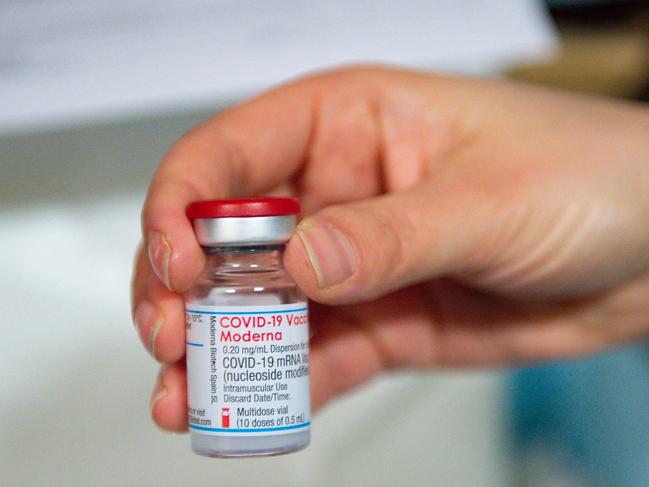
The trial comprised 11,700 paediatric volunteers in the United States and Canada, including 4,200 aged two to six years and 2,500 aged six to two months.
The company added that, after consulting with the FDA, it is also applying to be authorised among children six to 11 for two-doses of 50 micrograms, and updating its application for authorisation in kids aged 12 through 17.
The EMA and other regulators have already authorised the Moderna vaccine in these age groups.
Last month, the FDA postponed a meeting of a panel to consider the Pfizer-BioNTech Covid vaccine for children younger than five, saying it required additional data on third doses. The companies said they expected that data to be ready by April.
UK MARKS TWO YEARS SINCE FIRST LOCKDOWN
Britain on Wednesday held a minute’s silence to remember the victims of the coronavirus pandemic, on the second anniversary of the country’s first lockdown.
The tribute came as the country experiences another surge of infections, just weeks after scrapping all remaining restrictions, and record numbers in hospital in Scotland.
The “National Day of Reflection” saw members of the public fall silent at 12pm local time and calls for lights to be shone or flowers to be displayed in a window of their home at 8pm local time.
A bereaved families group tied yellow ribbons to Westminster Bridge in central London and the capital’s ambulance service held a service in its memorial garden.
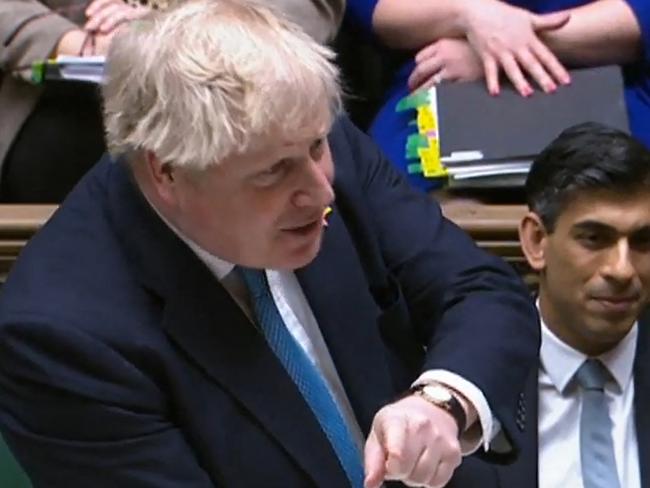
Landmarks across the UK will be lit up in yellow, the colour of end-of-life care charity Marie Curie, which has organised the event.
Britain has been hit by some of the highest pandemic death tolls in Europe. Nearly 164,000 people have died within 28 days of a positive Covid-19 test, while more than 186,000 have the virus listed on their death certificate, according to government statistics.
“Those lost to Covid will never be out of our hearts and minds, and today we reflect as a nation,” Prime Minister Boris Johnson said in a statement.
“The national day of reflection is a chance to come together, mourn and offer our collective support and sympathies to all those grieving.”
Mr Johnson, who in 2020 was treated in intensive care for Covid, said the event was also “a chance to thank everyone who cared for us throughout”, paying tribute to the “heroic efforts” of frontline health and care staff, grief counsellors and charity workers.
Mr Johnson ordered Britain’s first national lockdown on March 23, 2020, shutting schools and non-essential shops and services, and banning gatherings of more than two people.
He warned then that “many lives sadly will be lost”, though the current toll stands well above the worst predictions of British scientists or politicians made early in the pandemic, factoring in government interventions.
Following a successful vaccination program which has seen more than two-thirds of those aged over 12 given three doses, Johnson lifted all curbs earlier this year.
Cases have surged since, in part due to a subvariant of the Omicron strain, leading to another spike in hospital admissions.
But this has not resulted in a marked increase in those needing critical care. A fourth vaccine jab is being rolled out from next week to the most vulnerable, including the over-75s and the immunosuppressed.
Scotland, which sets its own health policy, has experienced the most dramatic rise in infections.
But its health minister Humza Yousaf said cases could now start to stabilise after “the most challenging week” for its hospitals.
“Every single health board (is) having to de-prioritise other treatments, and at times quite urgent treatment, and people are having to suffer as a result,” he warned.
But he added: “We are in a much better position when dealing with high case numbers than we were two years ago”.
NZ TO SCRAP TOUGH COVID RULES
New Zealand will relax its strict Covid-19 rules this week, with Prime Minister Jacinda Ardern citing a peaking of case numbers and high levels of immunity.
Ms Ardern announced on Wednesday that limits on outdoor crowd numbers would be scrapped late Friday, allowing sporting events and concerts unrestricted crowds.
She said vaccine passes and scanning codes would no longer be compulsory from April 4 and most vaccine mandates – requiring employees to be immunised or face the sack – would be dropped.
“This is not the end, but in some ways it is also a new beginning,” Ms Ardern told reporters, saying the changes acknowledged that “Covid is here to stay”.
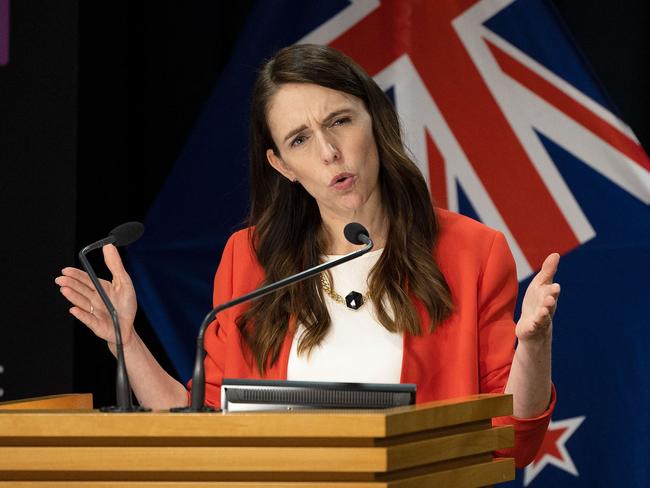
“To date, we’ve had more than 500,000 reported cases of Covid-19 and expert modellers say there have probably been 1.7 million actual infections,” she said.
“That figure, coupled with 95 per cent of New Zealanders being fully vaccinated, means we now have a high level of collective immunity.”
The announcement comes a week after Ardern outlined plans to open New Zealand’s borders earlier than originally scheduled.
New Zealand is experiencing a wave of Omicron-variant infections, with almost 21,000 new cases recorded on Tuesday – but there have been just 177 coronavirus-related deaths in a population of five million.
Ardern said vaccine mandates for the police, military and education sector would be dropped, although they would remain for healthcare and border workers.
US EXPERT BLASTS COVID MOVE AMID DELTACRON FEARS
A US epidemiologist and health economist has warned that Deltacron is “inevitably surging” despite health authorities starting to relax.
Scientists detected the hybrid variant, containing both the Delta and Omicron strains, in the US and Europe.
The new variant, which is also known as BA2, was officially recognised after its genomic sequence was uploaded to the global Covid database by virologists in France last week.
Experts believe the mutated “Deltacron” strain emerged from a patient who was infected with both simultaneously.
We live in the STUPIDEST timeline—#BA2 is rising and inevitably surging, yet many states close most of their mass testing sites even when public health experts warn it is TERRIBLE HORRIBLE NO GOOD VERY BAD idea. 🤦ðŸ»â€â™‚ï¸ #CovidIsNotOver
— Eric Feigl-Ding (@DrEricDing) March 20, 2022
HT @By_CJewett https://t.co/jQNSIGbe5C pic.twitter.com/qVWyiD5OB4
The new strain is believed to be as transmissible as measles with similar side effects to Omicron.
But the emergence of Deltacron has sparked new fears, with US epidemiologist and health economist Dr Eric Feigl-Ding lashing out at the US government for closing testing clinics across the country amid the new threat.
“We live in the STUPIDEST timeline —#BA2 is rising and inevitably surging, yet many states close most of their mass testing sites even when public health experts warn it is TERRIBLE HORRIBLE NO GOOD VERY BAD idea,” he wrote on Twitter.
“Testing sites provide health officials with data to anticipate new surges and variants in a way that at-home rapid tests cannot.”
His comments come just weeks after Australia was considering making changes to our own rules.
Earlier this month, national cabinet asked the expert health panel to provide urgent health advice on how states could end quarantine for close contacts.
Currently, household close contacts must isolate themselves for seven days from the last time they were in contact with the person with Covid-19.
Prime Minister Scott Morrison also flagged that this upcoming winter would be “challenging” as Australians “learn to live with the virus”.
However, the decision by the national cabinet was made before the Deltacron outbreak was widely known.
HONG KONG LIFTS AUSTRALIA FIGHT BAN
Hong Kong will resume international flights from Australia, United States, Britain and six other countries after backlash to some of the world’s toughest Covid-19 restrictions.
The finance hub has struggled to maintain China’s zero-tolerance policy during an Omicron-fuelled outbreak.
After the highly transmissible variant fuelled a wave of cases, authorities banned flights from nine countries deemed high-risk. But infections continued to climb rapidly, with more than a million cases and 5,900 deaths this year.
From April 1, Hong Kong will lift flight bans for Australia, Britain, Canada, France, India, Nepal, Pakistan, Philippines and the United States.
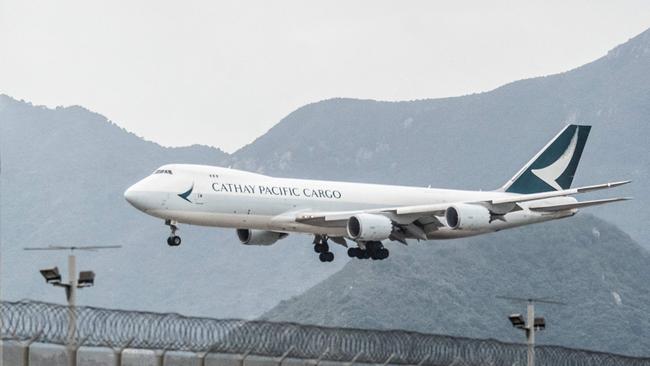
“The epidemic situations in those countries are not worse than Hong Kong’s, and most arrivals did not have serious symptoms,” Chief Executive Carrie Lam said during a press conference.
Hong Kong has also reduced the quarantine period for vaccinated arrivals starting April 1 to seven days in a designated hotel, followed by another seven days of at-home monitoring.
Currently, Hong Kong residents trying to return from most destinations face a two-week quarantine stay in expensive hotels.
Hong Kong, known as “Asia’s World City”, has seen a record exodus of foreign and local residents, with a net outflow of more than 134,000 people by mid-March.
A previously floated plan to mass test Hong Kong’s 7.4 million residents was also scrapped given the city’s limited resources.
“Our current opinion is to suspend it and whether we will do it depends on the development of the epidemic,” Lam said.
Lam also announced that kindergartens, primary schools and international schools will resume in-person teaching from April 19.
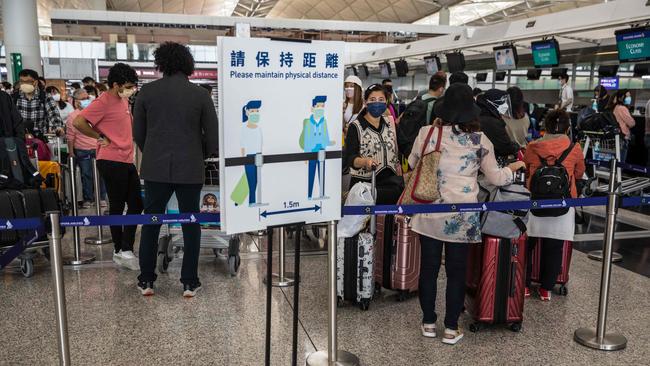
Beginning April 21, restaurants may stay open after 6:00pm for dine-in services — currently banned --- while public gatherings would be capped at four people, up from the current two.
Hong Kong’s deepened international isolation and lack of a road map to normality have incited complaints from business and diplomatic communities, even prompting some major international banks to accelerate relocations.
Lam’s announcement signalled a significant attitude shift to balance Hong Kong’s status as an international hub and as a gateway to mainland China.
“For any longer term public health strategy, we will have to take into account both factors that is maintaining Hong Kong’s accessibility to the mainland and also ensuring her continued connectivity with the outside world,” she said.
Tens of millions of people in regions across China have been put under stay-at-home orders since last week when Omicron clusters started threatening the country’s zero-Covid model.
UK TO ROLL OUT FOURTH COVID SHOT
England will begin rolling out its fourth coronavirus vaccine shot this week, the National Health Service (NHS) announced on Sunday local time, with millions of the country’s most vulnerable people being offered jabs.
The latest booster shot will be made available to care home residents, people aged over 75 and the immunosuppressed.
Around five million people are expected to be offered the jab, and 600,000 are being invited to book their appointments next week, according to the NHS.
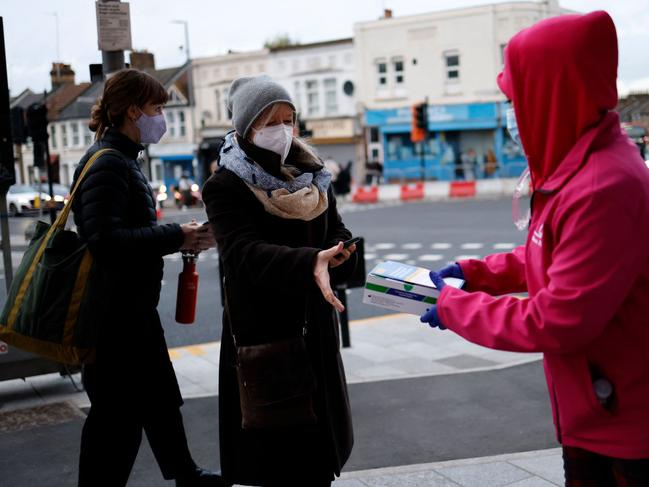
“Our phenomenal vaccination program has saved countless lives and built a wall of defence which has allowed us to learn to live with Covid,” Health and Social Care Secretary Sajid Javid said.
“Following the massive success of the rollout so far, we are now offering over-75s and the most vulnerable a spring booster dose to top up their protection against this virus.”
Cases are soaring once again across Britain due to a rampant Omicron variant, with around one in 20 people currently infected.
Hospitalisations are once again rising, but the number of people in high-dependency care remains low.
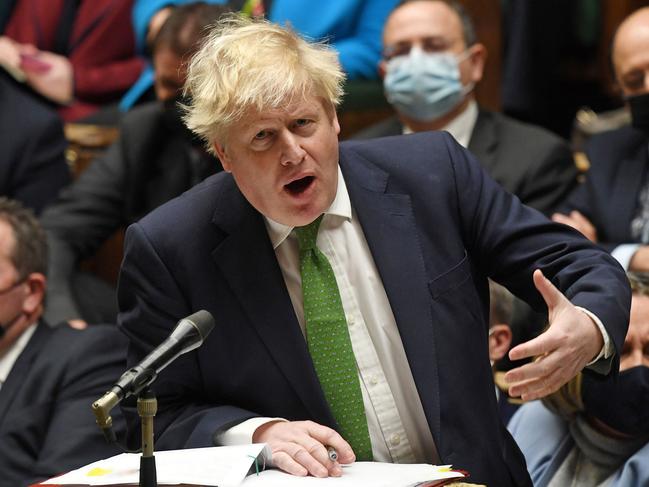
Speaking at his party’s spring conference over the weekend, Prime Minister Boris Johnson said: “We’re getting ready for the fourth jab, because we’re going to need it.”
Britain has been one of the world’s hardest hit countries during the pandemic, with more than 163,000 people dying after contracting the disease.
Originally published as Covid world updates: UK police to issue 20 initial ‘Partygate’ fines




